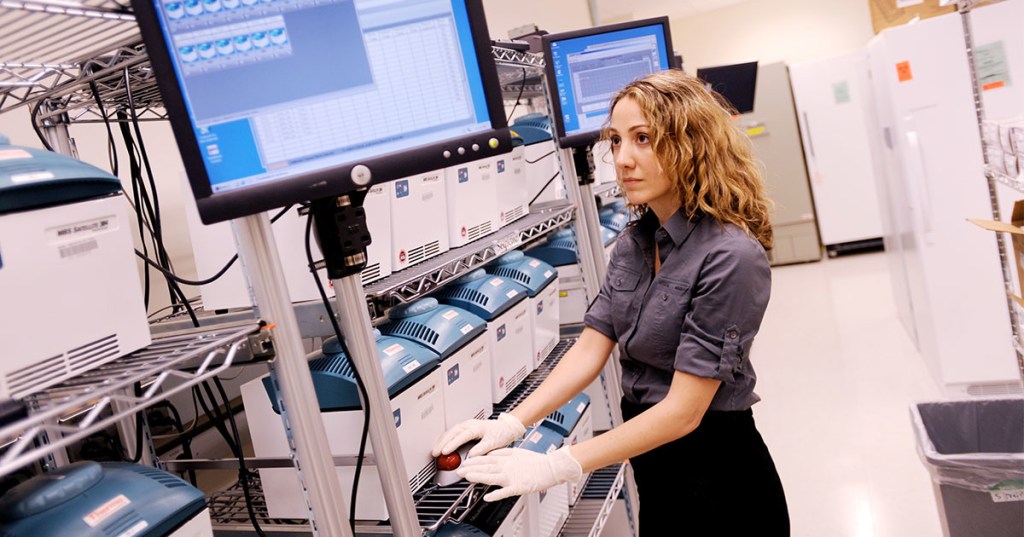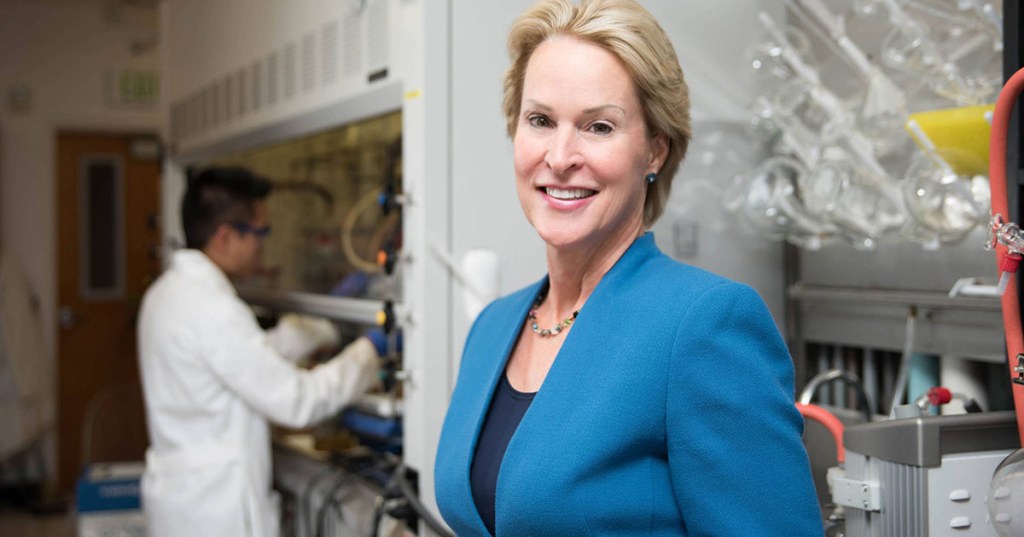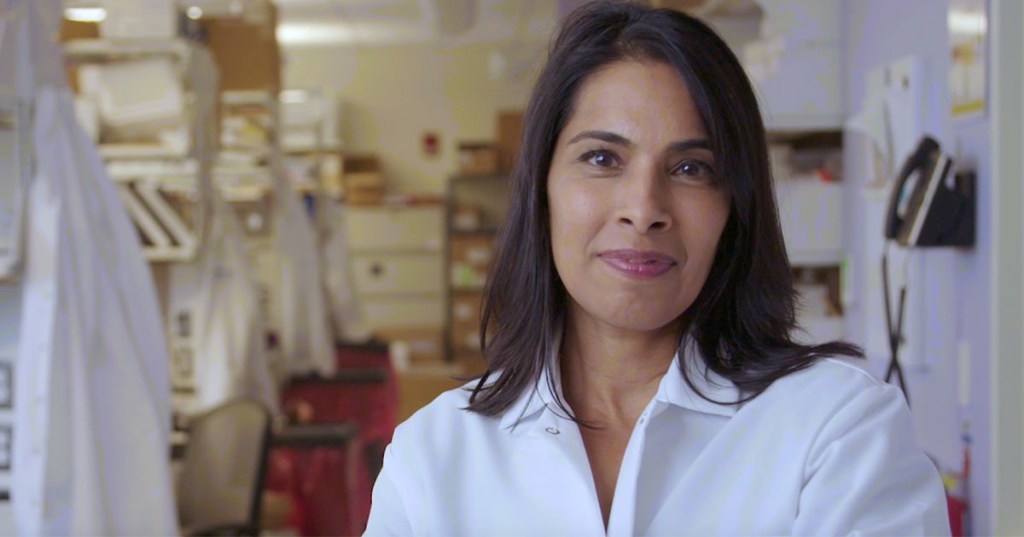Pardis Sabeti has had an obsession with math and logic from a young age. When she was little, her mother set up a makeshift classroom in their home where Sabeti’s older sister, Parisa, taught her everything she learned in school. By the time she started school herself, Sabeti already had all of her math facts memorized, so she simply worked on answering faster than everyone else. “I already had the information,” she told The Smithsonian, “so it just got me to focus on excellence.”
Her math proficiency led to a defining moment in 7th grade math class, one that foreshadowed her bright academic future. “The teacher came in with a VHS tape of a video of an MIT 2.007 (then 2.70) competition,” she told Upworthy. “It’s a wild event where mechanical engineers build robots for head-to-head competition with other robots. I saw this and thought, ‘What is this magical place?’ It was my Charlie and the Chocolate Factory moment. That’s when MIT came into my consciousness.”
After earning a National Merit Scholarship, Sabeti went on to MIT and earned a B.S. in biology with a perfect 5.0 GPA. (She was also class president and played on the varsity tennis team.) She won a Rhodes Scholarship to Oxford, where she earned a Masters and Doctorate in the field of evolutionary genetics. In 2006, she became the third woman to graduate summa cum laude from Harvard Medical School.
Sabeti says she didn’t come from a family of doctors or scientists, but her family history did impact her choices. She was born in Tehran, Iran, and her family immigrated to the U.S. shortly before the Iranian Revolution of 1979. “I thought that if you like math and you’re an immigrant, you’ll become a doctor,” she says.
As she advanced in her education, however, she realized she was more interested in medical research than in treating patients. Her graduate work included developing a breakthrough algorithm and tool for analyzing genetic factors in infectious diseases, helping scientists figure out humans adapt to microbes, and later how microbes themselves adapt and spread.
Sabeti went about her research in a somewhat backwards way, developing new tools to look at existing data rather than collecting new data and using established scientific tools to analyze it. She would eventually win several prestigious awards for her work — but not without going through the trials innovators often experience when they take a radically different approach.
“Everyone thought what I was trying to look for was a waste of time,” Sabeti says. “It seemed as if the work was going to go nowhere. Most people have a hard time somewhere in their arc in graduate school, but my outlook looked quite bleak for some time.”
But her hard work and unique approach has paid off. Her research and analysis of genetic factors in infectious diseases has earned her the Smithsonian American Ingenuity Award for Natural Science, the Vilcek Prize for Creative Promise, a National Institutes of Health New Innovator Award, as well as the honor of being named a Time magazine Person of the Year in 2014 and one of Time’s 100 Most Influential People in 2015.

Much of Sabeti’s success has come as a result of her field work in Africa. As an assistant professor at Harvard’s Center for Systems Biology, Sabeti collaborated with the Irrua Specialist Teaching Hospital in Nigeria to study the deadly Lassa virus — a project that posed serious risks. “I had tremendous challenges,” she says. “Universities are not always thrilled about having someone actively working with a deadly virus.”
Being awarded a five-year, $875,000 Packard Fellowship helped make her field work possible. The fellowship, awarded to promising scientists in the dawn of their career, offers unrestricted funds for recipients to use at their own discretion. Sabeti says the exploratory funding Packard offers gives researchers the opportunity to go into areas that aren’t traditionally funded, which is vital for innovation.
“The Packard Fellowship is the most generous junior faculty award,” she says. “It allows you to be creative, to be curious. That kind of funding is invaluable and hard to come by. It allowed me to think boldly, differently — things that would have been difficult for a junior faculty to do otherwise.”
“Packard is an organization who thinks about not only how to make science move, but for scientists to do so while also having a quality of life,” she adds.
Some of Sabeti’s funds went to helping the hospital in Irrua provide resources for all of their patients, providing more data for her research, which in turn helped doctors better diagnose and treat people. Christian Happi, director of the hospital’s Infectious Diseases Laboratory, told The Smithsonian that Sabeti’s work helped thousands of patients as he sung her praises. “Apart from being dedicated, generous with her time, generous with her knowledge, generous with everything, really,” Happi said, “she just really wants to be involved. That type of generosity is a quality that not many people have.”
Generosity, empathy, respect — these qualities, combined with fierce determination and drive, define Sabeti’s approach to her work. She says one of her life goals is to train students to be good people as well as good scientists. As part of that effort, Sabeti has partnered with a middle school to create an outbreak simulation for students to figure out how to contain. “It’s a full fledged, 200 person, massive outbreak,” she says. “We simulated this by sending a virtual virus through bluetooth.” The simulation, which includes an app and other technical materials, is being used in multiple schools.
Teaching students about infectious diseases is only one of Sabeti’s passion projects. The remarkably well-rounded scientist also plays bass guitar and is the lead singer of an alternative rock band called Thousand Days. Before a near-fatal ATV accident in 2015 shattered her pelvis and knees, she enjoyed competitive tennis and volleyball and was a regular rollerblader.

And she brings that energy and creativity into her lab. The Sabeti Lab at Harvard creates an elaborate holiday card every year to highlight her team and the work they’re doing, hoping to share the joy of science and inspire young scientists. “We get to show there’s this very creative and different life you can have,” Sabeti says. In fact, that’s what she wants aspiring scientists — especially female scientists — to realize.
“Much of what people see of science is a culture created by men many decades ago,” she says. She wants to help everyone see that they can have a rewarding life in the sciences, to “see that they can be themselves, that they can do hardcore technical work that advances the field, while just being who we are.”


















